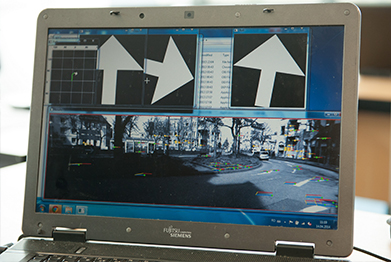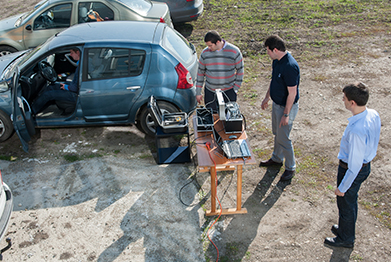Master's degree

The master's field in which this study programme integrates is Automotive Engineering. The duration of studies is 2 years (120 ECTS credits), and its main purpose is to provide graduates with the knowledge, skills and competencies necessary for a professional career in the automotive industry and research-design-development structures in the field. The master's degree programme Motor Vehicle and Future Technologies offers specialization routes in the fields of motor propulsion equipment and other categories of motor systems (including those with special purpose). Students acquire skills in modelling, simulation and constructive optimization of structures, equipment and systems of vehicles: design and implementation of testing procedures for systems and equipment of vehicles, testing systems and components for vehicles of the future; designing integrated systems for analysing the life cycle of automotive systems, their impact on the environment in terms of sustainable development, etc.
Prospects after graduation: graduates can work as design engineers in the field of automotive engineering or as research engineers in the field of automotive engineering or they can continue studying for a doctoral degree.

The master's field of this English-taught study programme is Automotive Engineering, and the duration of studies is 2 years (120 ECTS credits). In the second year, the programme offers two elective courses, namely Virtual Engineering in Automotive Mechanical Design and Virtual Engineering in Electrical and Hybrid Automotive Design. The latter route is especially dedicated to the development of skills and abilities for research excellence. The master’s degree programme offers theoretical, applied and practical training in the field of vehicle design engineering based on virtual reality technologies by developing applications on identification, structure, conception, design, implementation and experimentation of design, operation, construction and technology.
Perspectives after graduation: expert in vehicle design, expert in applied informatics, expert in mechatronics, etc.

The master's field in which this study programme falls is Automotive Engineering, and it has a duration of studies of 2 years (120 ECTS credits). Students acquire skills in the analysis and planning of transport networks; design of transport networks; modelling, calculation, simulation and optimization of transport infrastructure nodes; development and implementation of intelligent transport systems; control of chemical and noise pollution in transmission networks; ensuring the maintenance of road vehicles; analysis of materials for parts and subassemblies of road vehicles; design and implementation of testing procedures for systems and equipment; design of road vehicle maintenance technologies; design of environmental protection systems, etc.
Perspectives after graduation: the graduates of this master's degree study programme can be employed by the county and local authorities whose object of activity is the development of the transport of people and goods; by the Road Authorities; Police Inspectorates - Traffic Police; National Administration of Roads and Bridges; freight transport companies; urban and extra-urban public transport; insurance companies; road maintenance companies; transport consultancy, etc.

The master's field to which this study programme belongs is Automotive Engineering. The duration of studies is 2 years (120 ECTS credits), and the main purpose of the programme is to provide graduates with the knowledge, skills and competencies necessary for a professional career in the automotive industry and research-design-development structures in the same field. Students acquire skills in modelling, simulation and constructive optimization of structures, equipment and systems of vehicles.
Perspectives after graduation: graduates can be employed as design engineers in the field of automotive engineering or as research engineers in the field of automotive engineering.

The master's field in which this study programme integrates is Mechanical Engineering. The duration of studies is 2 years (120 ECTS credits), while students acquire advanced engineering skills (simulation - calculations, design, testing - correlation) and skills for software creation.
Perspectives after graduation: graduates of this master's degree programme can be hired by companies in the country and abroad, as design engineer (advanced calculations in design departments, calculations or engineering services), software development engineer (especially for mechatronic software), engineer for testing mechatronic assemblies and preparing data for correlation with virtual models.

The master's field in which this English-taught study programme integrates is Mechanical Engineering. The duration of studies is 2 years (120 ECTS credits). The master's programme offers interdisciplinary and inter-field engineering studies with emphasis on mechanical engineering. The main competencies are related to the students’ in-depth acquisition of current and future methods, techniques and technologies related to the design and production of propulsion systems, internal combustion engines in particular. Students are also familiarized with current and future trends related to the design and production of propulsion systems. The programme ensures students acquisition and knowledge of in-depth notions and terminology especially in the field of mechanical engineering, but also in related engineering fields, and ensures the development of the necessary skills for graduates to address the issue of designing and developing a product by using advanced methods, methodologies and technologies, etc.
Perspectives after graduation: graduates of this master's degree programme can develop research and / or managerial careers in the field of design and implementation of propulsion systems.
Who it addresses: The master's degree programme Practical Integrated Methods for Propulsion Systems Engineering is addressed mainly to graduates from the Faculty of Mechanical Engineering, the Faculty of Technological Engineering and Industrial Management, the Faculty of Product Design and Environment, and the Faculty of Materials Science and Engineering.
The purpose of the master's program "Command and control systems for motor vehicles" is to train as a well-trained specialist, the graduate of the undergraduate cycle in the field of Road Vehicles, Transport and Traffic Engineering, Mechanical Engineering, Mechatronics, Automatic, and Information Technologies, for an easy adaptation in the internal and external economic environment.
The essential element that highlights the proposed study program is that through its development, new aspects specific to the automotive industry, which are in a permanent dynamic of development/improvement, such as electric and autonomous vehicles, will be addressed. Its realization is possible in a mixed team made up of specialists from the fields of: automotive engineering, automation, IT and computers, electrical and electronic engineering.
Thus, by attending the master's program Command and control systems for motor vehicles, the master's students will acquire thorough knowledge in engineering fields, thus ensuring the necessary skills for a professional career in the field of the motor vehicle manufacturing industry, respectively in its related sectors. Those who will follow this program will benefit from advanced skills in the newest sub-fields of the automotive industry, such as autonomous vehicles, energy management, electric and hybrid vehicles, driver assistance systems, virtual reality simulation, or networks and communication protocols.
Through judiciously correlated theoretical, applied and experimental training, this master's program will develop competencies and skills for professional careers of excellence in production, services and research in the design of control and command systems of 21st century vehicles.
Curriculum: Programming and simulation languages, Propulsion of electric and hybrid vehicles, Integrated electronic control units, Energy storage and energy management, Automotive communication networks and protocols, Driver assistance systems, Autonomous and connected vehicles, Automotive software development, Modeling and simulation in virtual reality.
Prospects after graduation: the graduates of this master's study program can develop a research and/or managerial career in the field of design and realization of control systems for teleoperation as well as semi-autonomous and autonomous control systems.
Who is it addressed to?: The master's program "Command and control systems for motor vehicles" is addressed to graduates from the 1st cycle of university studies, from the following accredited degree programs: Road Vehicles, Transport and Traffic Engineering, Mechanical Engineering, Mechatronics, Automatic, and Information Technologies.